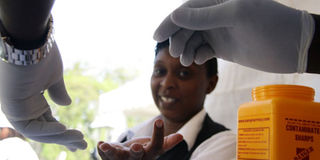With these simple steps, you can control diabetes

Diabetes has no cure, so if you are diagnosed with the condition, you need to learn how to live with it. This involves making some lifestyle changes, especially those related to diet, to ensure balanced levels of blood glucose. With good control, complications associated with the condition, such as diabetic retinopathy and nephropathy can be avoided. PHOTO | FILE
What you need to know:
- Honour all appointments with your doctor, and take this opportunity to talk about any changes you might have noticed with your health.
- If you are obese or overweight, make a commitment to shed off the excess weight. Excess body weight interferes with the ability of the cells to react to insulin, causing high blood sugar.
- Maintaining a healthy weight helps to control the levels of your blood sugar, cholesterol, blood pressure, and also reduces the risk of developing other health problems, such as cardiovascular diseases.
Diabetes has no cure, so if you are diagnosed with the condition, you need to learn how to live with it.
This involves making some lifestyle changes, especially those related to diet, to ensure balanced levels of blood glucose. With good control, complications associated with the condition, such as diabetic retinopathy and nephropathy can be avoided. Other complications include diabetic neuropathy and diabetic foot, which, according to Dr Nancy Kunyiha, a diabetes specialist, are a leading cause of amputations in the country. The risk of heart attack and stroke is also high when one has diabetes.
WHAT TO DO
To minimise the risk of these health complications, a diabetic should observe the following:
Take insulin and/or other blood sugar medicines as prescribed by the doctor. Take medication at all times, even when you feel fine.
Honour all appointments with your doctor, and take this opportunity to talk about any changes you might have noticed with your health.These regular check-ups are very important in managing diabetes, since they can help identify any related complications.
Eat healthy: Your diet should be low in fat and salt. Also cut down on all types of sugar and saturated fats.
Divide your plate into two equal parts. Half of the plate should be filled with non-starchy vegetables such as carrots, tomatoes, broccoli and traditional vegetables.
Divide the other half between proteins and starch (preferably whole grains such as brown rice and whole bread). Starch should be about one normal tea cup. Snacks should be healthy, for instance a medium-sized fruit.
Take plenty of fluids to prevent dehydration. Water is usually the best choice. Avoid sweetened and carbonated drinks such as sodas.
Do not smoke, since tobacco increases the risk of stroke and cardiovascular diseases.
If you are obese or overweight, make a commitment to shed off the excess weight. Excess body weight interferes with the ability of the cells to react to insulin, causing high blood sugar. Maintaining a healthy weight helps to control the levels of your blood sugar, cholesterol, blood pressure, and also reduces the risk of developing other health problems, such as cardiovascular diseases.
Exercise regularly – for instance taking brisk walks, performing house chores, and dancing.
UNDER CONTROL
Take care of your feet by keeping them clean, dry and moisturised, and check for swellings, cuts, blisters, and sores on a daily basis. Diabetes can reduce the supply of blood to the feet, causing peripheral neuropathy (nerve damage). This can prevent healing of minor foot injuries and wounds.
Have your eyes screened regularly, since you are at great risk of developing diabetic retinopathy, which causes loss of eyesight. For this reason, Dr Wendy Njoya, an ophthalmologist, says that all diabetic patients must undergo a dilated fundoscopy test immediately after diagnosis, and yearly thereafter, even when there are no symptoms of eye problems. This test assesses the eye nerve and retina.
Brush your teeth not only regularly, but thoroughly too – this includes flossing. People with diabetes are more susceptible to gum infection. If you notice swollen, red, or bleeding gums, see a dentist immediately.
Diabetes does not have to keep you from living the kind of life you desire. With good management, you can control the condition.




